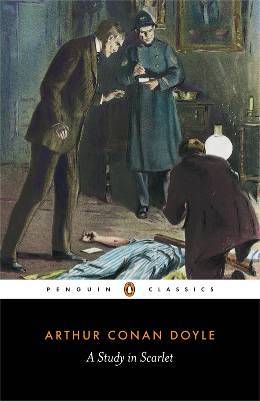A Study in Scarlet
By: Arthur Conan Doyle

There's no doubt that Sherlock is a huge character in our modern culture. It revolutionized detective stories and opened the door for the countless shows, books, and movies we have now about crime and detective work. But I was interested to see if the original works measured up to their reputation. (As I also was curious about this when going into The Lord of the Rings, I shouldn't have been surprised when it not just met, but exceeded my expectations.)
I've always loved Sherlock Holmes stories. I've watched quite a few different movies and I adore BBC Sherlock. Season 3 was especially fantastic, but then it ended. I was in the mood for more Sherlock, and I'd always been intending to pick up the books. So I started. AND I LOVED IT. I think it was an interesting story told well and with interesting characters, everything that you expect from the infamous Sherlock Holmes.
I think the deductions translate well on paper. They come out in this sort of rapid-fire train of thought that is just plain fun to read. The language is simple, but well-used and clear. It feels like a real life adventure story to me, even in the slower bits.
This was just a really fun, well-written, fast-paced read. I cannot wait to delve further into the original canon that Sir Arthur Conan Doyle created.
Quotes:
"...I meditated upon the many-sidedness of the human mind."
"I ought to know by this time that when a fact appears to be opposed to a long train of deductions, it invariably proves to be capable of bearing some other interpretation."
"It is a mistake to confound strangeness with mystery."
No comments:
Post a Comment